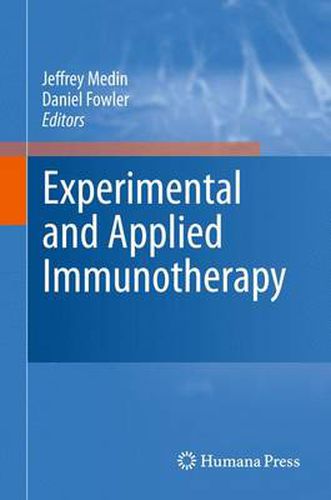Readings Newsletter
Become a Readings Member to make your shopping experience even easier.
Sign in or sign up for free!
You’re not far away from qualifying for FREE standard shipping within Australia
You’ve qualified for FREE standard shipping within Australia
The cart is loading…






This title is printed to order. This book may have been self-published. If so, we cannot guarantee the quality of the content. In the main most books will have gone through the editing process however some may not. We therefore suggest that you be aware of this before ordering this book. If in doubt check either the author or publisher’s details as we are unable to accept any returns unless they are faulty. Please contact us if you have any questions.
Immunotherapy is now recognized as an essential component of treatment for a wide variety of cancers. It is an interdisciplinary field that is critically dependent upon an improved understanding of a vast network of cross-regulatory cellular populations and a diversity of molecular effectors; it is a leading example of translational medicine with a favorable concept-to-clinical-trial timeframe of just a few years. There are many established immunotherapies already in existence, but there are exciting new cancer immunotherapies just on the horizon, which are likely to be more potent, less toxic and more cost effective than many therapies currently in use.
Experimental and Applied Immunotherapy is a state-of-the-art text offering a roadmap leading to the creation of these future cancer-fighting immunotherapies. It includes essays by leading researchers that cover a wide variety of topics including T cell and non-T cell therapy, monoclonal antibody therapy, dendritic cell-based cancer vaccines, mesenchymal stromal cells, negative regulators in cancer immunology and immunotherapy, non-cellular aspects of cancer immunotherapy, the combining of cancer vaccines with conventional therapies, the combining of oncolytic viruses with cancer immunotherapy, transplantation, and more. The field of immunotherapy holds great promise that will soon come to fruition if creative investigators can bridge seemingly disparate disciplines, such as T cell therapy, gene therapy, and transplantation therapy. This text is a vital tool in the building of that bridge.
$9.00 standard shipping within Australia
FREE standard shipping within Australia for orders over $100.00
Express & International shipping calculated at checkout
This title is printed to order. This book may have been self-published. If so, we cannot guarantee the quality of the content. In the main most books will have gone through the editing process however some may not. We therefore suggest that you be aware of this before ordering this book. If in doubt check either the author or publisher’s details as we are unable to accept any returns unless they are faulty. Please contact us if you have any questions.
Immunotherapy is now recognized as an essential component of treatment for a wide variety of cancers. It is an interdisciplinary field that is critically dependent upon an improved understanding of a vast network of cross-regulatory cellular populations and a diversity of molecular effectors; it is a leading example of translational medicine with a favorable concept-to-clinical-trial timeframe of just a few years. There are many established immunotherapies already in existence, but there are exciting new cancer immunotherapies just on the horizon, which are likely to be more potent, less toxic and more cost effective than many therapies currently in use.
Experimental and Applied Immunotherapy is a state-of-the-art text offering a roadmap leading to the creation of these future cancer-fighting immunotherapies. It includes essays by leading researchers that cover a wide variety of topics including T cell and non-T cell therapy, monoclonal antibody therapy, dendritic cell-based cancer vaccines, mesenchymal stromal cells, negative regulators in cancer immunology and immunotherapy, non-cellular aspects of cancer immunotherapy, the combining of cancer vaccines with conventional therapies, the combining of oncolytic viruses with cancer immunotherapy, transplantation, and more. The field of immunotherapy holds great promise that will soon come to fruition if creative investigators can bridge seemingly disparate disciplines, such as T cell therapy, gene therapy, and transplantation therapy. This text is a vital tool in the building of that bridge.